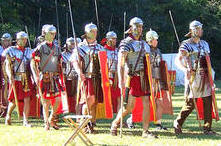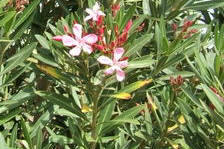|
Roman soldiers, particularly those who
operated at the edges of the Roman Empire, did not depend on supply lines. They
foraged for their own food and repaired or made their own weapons and equipment.
This included even the smallest and least dangerous of items, such as canteens.
 A Roman legion, busily conquering
the Middle East
in the first century B.C.E., bivouacked in the arid countryside. Some of the
soldiers decided to replace their worn-out wooden canteens during the
respite. Large trees were scarce in the dry climate, but they found a small native
shrub growing nearby whose trunk seemed to have
the working characteristics needed to make the replacements. The soldiers
fashioned canteens from this wood, filled them with water, and died within
a few days. A Roman legion, busily conquering
the Middle East
in the first century B.C.E., bivouacked in the arid countryside. Some of the
soldiers decided to replace their worn-out wooden canteens during the
respite. Large trees were scarce in the dry climate, but they found a small native
shrub growing nearby whose trunk seemed to have
the working characteristics needed to make the replacements. The soldiers
fashioned canteens from this wood, filled them with water, and died within
a few days.
 The
shrub was Oleander (Nerium
oleander). It contained a
water-soluble extractive similar to digitalis, a chemical used to treat
cardiac arrhythmia and other heart
ailments. When ingested by healthy invading soldiers, it causes
irregular heartbeat, drowsiness, seizures, coma, and death. The
shrub was Oleander (Nerium
oleander). It contained a
water-soluble extractive similar to digitalis, a chemical used to treat
cardiac arrhythmia and other heart
ailments. When ingested by healthy invading soldiers, it causes
irregular heartbeat, drowsiness, seizures, coma, and death.
Copyright
© 2009 Bookworks, Inc. |
 A Roman legion, busily conquering
the Middle East
in the first century B.C.E., bivouacked in the arid countryside. Some of the
soldiers decided to replace their worn-out wooden canteens during the
respite. Large trees were scarce in the dry climate, but they found a small native
shrub growing nearby whose trunk seemed to have
the working characteristics needed to make the replacements. The soldiers
fashioned canteens from this wood, filled them with water, and died within
a few days.
A Roman legion, busily conquering
the Middle East
in the first century B.C.E., bivouacked in the arid countryside. Some of the
soldiers decided to replace their worn-out wooden canteens during the
respite. Large trees were scarce in the dry climate, but they found a small native
shrub growing nearby whose trunk seemed to have
the working characteristics needed to make the replacements. The soldiers
fashioned canteens from this wood, filled them with water, and died within
a few days. The
shrub was Oleander (
The
shrub was Oleander (